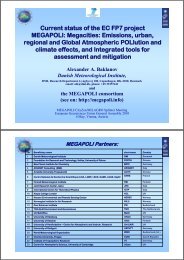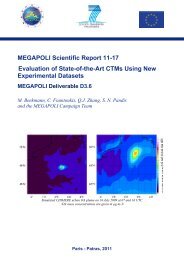D E S C R I P T I O N O F W O R K - MEGAPOLI - Dmi
D E S C R I P T I O N O F W O R K - MEGAPOLI - Dmi
D E S C R I P T I O N O F W O R K - MEGAPOLI - Dmi
Create successful ePaper yourself
Turn your PDF publications into a flip-book with our unique Google optimized e-Paper software.
<strong>MEGAPOLI</strong> 212520<br />
Table 2.2 <strong>MEGAPOLI</strong> Advisory Group Members<br />
Name Organization Expertise<br />
Prof. Paul Crutzen Max Planck Institute for<br />
Chemistry, Germany<br />
Nobel Prize in Chemistry in 1995<br />
Prof. Luisa Molina Molina Center, Mexico<br />
Megacity Air Quality, Science<br />
MIT, USA<br />
Leader of Mexico City projects<br />
Prof. Greg Carmichael U. Iowa, USA Chemical Transport Modelling,<br />
Asian megacity air quality<br />
Prof. Yutaka Kondo Res. Center for Advanced Sci. and Urban air pollution and global<br />
Tech., U. Tokyo, Japan<br />
change, Tokyo air quality<br />
Dr. Georg Grel National Oceanic and Atmospheric WRF-Chem working group<br />
Administration, USA<br />
leader, Integrated modelling tools<br />
Dr. Philippe Lameloise AIRPARIF, France Director of AIRPARIF<br />
Dr. Jason Ching Environmental Protection Agency, Chief (1990-8) of the EPA atmos-<br />
USA<br />
pheric model development branch<br />
Prof. Nikolai Kasimov Moscow State University, Russia Sustainable development, geobiochemistry<br />
of urban environment<br />
Dr. Brendan P. Kelly Group on Earth Observations<br />
(GEO), Switzerland<br />
GEO Secretariat<br />
Prof. Bob Bornstein San Jose State University, USA Urban air pollution and feedbacks,<br />
New York plume study<br />
Work Package Leaders<br />
A number of work packages combine the expertise of <strong>MEGAPOLI</strong> partners across different research areas.<br />
For example WP6 integrates regional with global chemical transport modelling. To ensure that the leadership<br />
of each WP will be able to cover all scientific aspects of the WP we have decided to have more than one<br />
leading participant in most of the WPs. This will not only ensure the high quality of the corresponding<br />
scientific work, but will also ensure the faster communication between WP leaders (e.g., during periods<br />
when one of the leaders is not available). The coordinators will not lead any WP so that they can focus on the<br />
overall project and the links among the WPs.<br />
Table 2.3 <strong>MEGAPOLI</strong> Work Package Leaders<br />
WP No. Title Lead Participant(s)<br />
1 Emissions P. Builtjes<br />
64<br />
H. Denier van der Gon<br />
2 Megacity Environments: Features, Processes and S. Grimmond<br />
Effects<br />
I. Esau<br />
3 Megacity Plume Case Study M. Beekmann<br />
U. Baltensperger<br />
4 Megacity Air Quality N. Moussiopoulos<br />
5 Regional and Global Atmospheric Composition J. Kukkonen<br />
A. Stohl<br />
6 Regional and Global Climate Effects W. Collins<br />
F. Giorgii<br />
7 Integrated Tools and Implementation R. Sokhi<br />
H. Schlünzen<br />
8 Mitigation, Policy Options and Impact<br />
R. Friedrich<br />
Assessment<br />
D. van den Hout<br />
9 Dissemination and Coordination A. Baklanov<br />
S. Pandis<br />
M. Lawrence<br />
Management of Knowledge<br />
Internal communication and dissemination: The internal dissemination of knowledge will be managed by<br />
the Project Officers, who will boost the communication flow via internal project web pages and e-mail-




